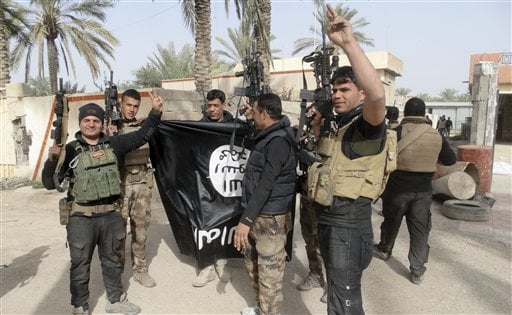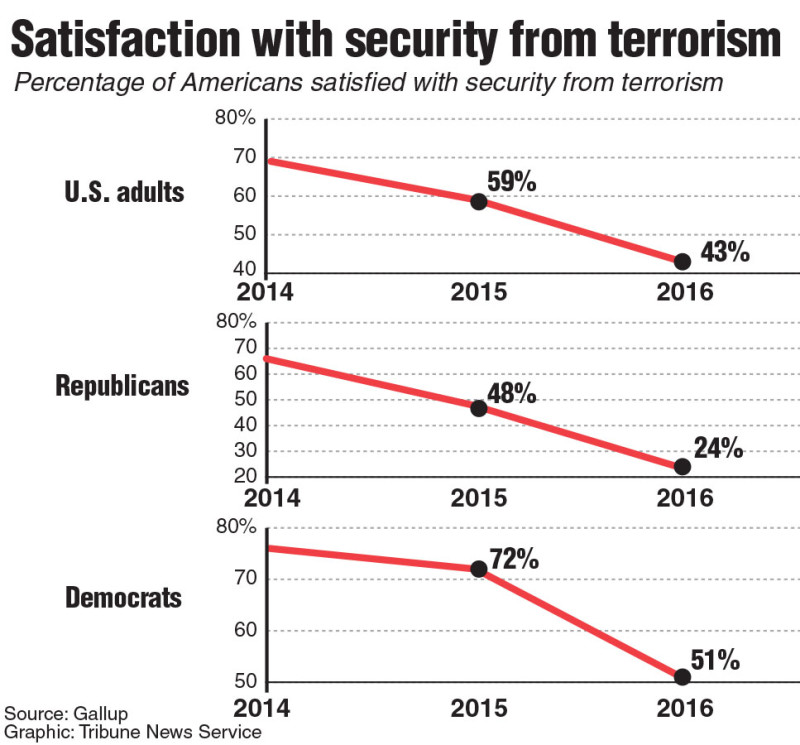
One evening last November, when Parisians were preparing to go out for the start of the weekend, news of three explosions near the Stade de France circulated not long after the three suicide bombers detonated their vests. Shortly after, armed terrorists, pledging allegiance to the Islamic State, or ISIS, would open fire in a concert hall and at cafes around the city killing 130 people in all.
Americans have heard the news, and though it has not stopped them from venturing out and living their lives, fear of a terrorist attack and for the security of the nation has grown.
In the last four months, ISIS has launched numerous attacks on foreign targets, the most notable including Paris, Beirut and a Russian plane that was downed over Egypt’s Sinai Pensula. The Obama Administration has responded by increasing airstrikes, as well as providing support and training for the Iraqi military to avoid putting American boots on the ground.
Though the San Bernardino shooters claimed allegiance to ISIS in a Facebook post before their shooting and their deaths, there has not been an attack comparable to the attacks in Paris or others internationally on American soil. This, Scott Hibbard, a political science professor at DePaul, said this can be related to the fact that ISIS is a regional threat and not a dire threat to Americans.
“The threat to Americans is not significant,” Hibbard said. “The threat to minorities in Iraq is high, but that’s a reflection of the fact that the war is taking place overseas.”
Religious minorities, including Shiite Muslims and Christians, have faced more attacks as ISIS attempts to hold onto land and gain more. According to the Department of Defense, Iraqi military forces are clearing Ramadi, which is an ISIS stronghold. The cost of the operation has reached $5 billion, according to the department, and is running at $11 million a day, Army Col. Steve Warren said in a message via satellite from Baghdad.
The recent attacks, Hibbard said, could be an attempt by ISIS to continue to shock people and invoke fear even though it has lost territory since the beginning of the airstrikes. Along with the airstrikes, the the coalition is going after ISIS-controlled oil fields and oil shipments, which is inhibiting the organization’s flow of revenue.
The fight against ISIS, and the security of the nation, is one that has many battlegrounds. ISIS has also conducted cyber attacks in an effort to spread fear. Also in November 2015, after the death of Jihadi John, the man seen decapitating prisoners of war, ISIS claims to have hacked around 54,000 Twitter accounts. Earlier last year, a group associated with ISIS released a list of names, addresses and other data related to U.S. servicemen and women of varying branches.
Other countries, such as China and Russia, have also used cyber warfare to mine data from the U.S. Though fear among Americans may grow as ISIS continues its attacks, individuals are not typically the targets of cyber attacks, and remaining vigilant can help protect documents and individuals from groups like ISIS.

“People don’t know how badly things can go wrong,” Jacob Furst, professor in the college of Computing and Digital Media, said. “They may not know the ways to protect themselves. People are too nice. We all need a bit of paranoia.”
Furst also said that awareness of these issues and the importance of personal security, as well as education, are both important for the national security.
The Transportation Security Administration announced the “If You See Something, Say Something” campaign much like the public transportation campaign, which urges people to speak up about suspicious behavior and packages. ISIS planted a bomb on a Russian plane in November 2015 that crashed in Egypt, killing all 224 people on board.
French president Francois Hollande announced Friday that the state of emergency put in place after the shootings may be extended another three months if parliament accepts the plan.
For Caitlin Roberts, a student who recently returned from studying abroad in London, being in Europe after the Paris attacks did cause some anxiety, but did not stop her from enjoying the trip.
“My experiences flying were good. I always felt really safe and things moved smoothly at the airport,” Roberts said. “I was a bit nervous and anxious after the attacks, especially flying from London back to Chicago, but Heathrow was very thorough with security and I knew they had everything under control.”
Though there are plenty of reasons behind the rising fear, survey results could be related to not only the attacks in headlines, but also the presidential race — invoking fear and pointing to purported failures in President Obama’s foreign policy to boost poll numbers on both sides of the aisle.
“(We) can tell people not to worry about terrorism, but they still will,” Hibbard said. “Of the mass shootings that occurred last year, very few were carried out by Islamist militants. So we have to ask ourselves is this an ISIS problem or a gun problem?”

